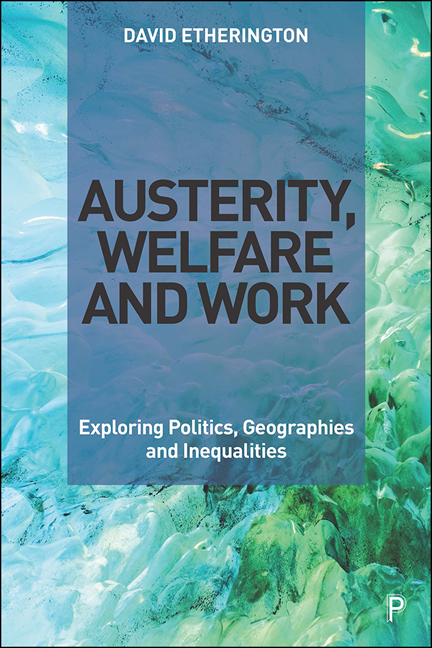Book contents
- Frontmatter
- Dedication
- Contents
- List of Tables and Box
- List of Abbreviations
- Notes on the Author
- Acknowledgements
- Preface
- 1 Introduction: the Crisis and Austerity Neoliberalism
- 2 Conceptualising Austerity, Welfare and Employment Relations
- 3 Embedding Neoliberal Austerity: from New Labour to the Conservative Government
- 4 Resisting Welfare Reforms and Work-First Policies
- 5 ‘Devolving’ Welfare Policies in Greater Manchester’s Precarious Economy
- 6 Challenging Welfare Conditionality and Insecure Work
- 7 Towards a more Inclusive Labour Market: Lessons from Denmark
- 8 Conclusions: Progressive Alternatives to Austerity
- Notes
- References
- Index
7 - Towards a more Inclusive Labour Market: Lessons from Denmark
Published online by Cambridge University Press: 10 March 2021
- Frontmatter
- Dedication
- Contents
- List of Tables and Box
- List of Abbreviations
- Notes on the Author
- Acknowledgements
- Preface
- 1 Introduction: the Crisis and Austerity Neoliberalism
- 2 Conceptualising Austerity, Welfare and Employment Relations
- 3 Embedding Neoliberal Austerity: from New Labour to the Conservative Government
- 4 Resisting Welfare Reforms and Work-First Policies
- 5 ‘Devolving’ Welfare Policies in Greater Manchester’s Precarious Economy
- 6 Challenging Welfare Conditionality and Insecure Work
- 7 Towards a more Inclusive Labour Market: Lessons from Denmark
- 8 Conclusions: Progressive Alternatives to Austerity
- Notes
- References
- Index
Summary
Overall, the regulative setting provides rights and protection to the majority of the workforce, so that employment covered by a collective agreement in general cannot be considered precarious employment in Denmark. At the same time, the Danish welfare system provides different forms of comparatively high social security standards for the majority of the workforce. Because this regulation apply to most types of employment, persons working in what is often referred to as non-standard forms of work such as part-time work and fixed-term employment enjoy the same rights and have the same level of protection as those working in the standard, open ended contract – at least at the formal level. Because of the degree of regulation and protection for these forms of non-standard work, they are not at a general level considered precarious in a Danish context. (Rasmussen et al, 2016: 21)
In spite of the changes in the favour of capital, the Danish development has also been one of the continuities. The national institutions regulating labour market and working life are still strong and encompassing. The class compromise founded in 1899, although reformed and changed in many respects over the years, is still in force. Strong corporatist features are still present, although increasingly encroached by market forces. Danish industrial relations are still distinctly different from liberalist as well as legalistic models. (Lind and Knudsen, 2018: 599)
Introduction
This book is positioned within theoretical perspectives that focus on welfare states as systems of power and negotiation between key social forces acting in and through the state apparatus. In this context, we suggest that successive welfare reforms – from New Labour's welfare to-work programmes to the development of a more punitive welfare strategy under the coalition and current Conservative government – are generating considerable debate on the re-regulation of labour markets and alternatives to work-first policies. There is an emerging consensus, as demonstrated in this book, that the work-first approach is deeply problematic. While there are calls from the policy and political community to scrap or stall Universal Credit (UC), the question of what will replace it needs to be explored in more detail.
- Type
- Chapter
- Information
- Austerity, Welfare and WorkExploring Politics, Geographies and Inequalities, pp. 133 - 154Publisher: Bristol University PressPrint publication year: 2020



